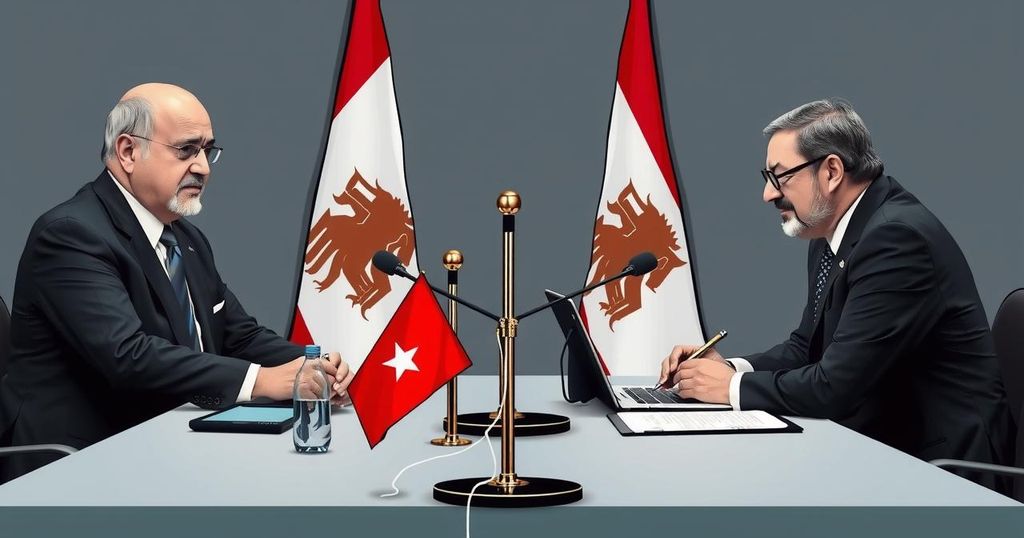Lebanese Leaders Seek Consensus Ahead of Presidential Vote

Lebanese leaders are meeting ahead of a critical parliamentary session aimed at electing a new president after over two years without one. Army Chief Joseph Aoun is viewed as the leading candidate, while Hezbollah’s weakening position raises prospects for political consensus. However, significant divisions among political factions continue to challenge the election process and exacerbate Lebanon’s ongoing crisis, which necessitates urgent reforms.
Lebanese political leaders convened on Wednesday, just prior to a parliamentary session intended to elect a new president for the nation, which has been without a head of state for over two years amid significant political fragmentation. Despite Hezbollah’s diminished influence due to recent conflicts, the chances of reaching a consensus remain uncertain. Army Chief Joseph Aoun is recognized as the frontrunner, with proponents advocating for his leadership to manage military operations in southern Lebanon.
A ceasefire agreement reached on November 27 mandates the withdrawal of Hezbollah fighters near the Israeli border, subsequently allowing only the national army to oversee the area. Nonetheless, several political factions remain hesitant to endorse Aoun amidst the thirteenth attempt to select a new leader since the prior president Michel Aoun’s term concluded in October 2022. It is imperative to note that Joseph Aoun and Michel Aoun are not related, despite sharing the same surname.
Lebanon’s political landscape, still recovering from a civil war that lasted from 1975 to 1990, typically requires preliminary consensus on candidates before any parliamentary vote is successful. After a year of war has left Hezbollah in a weakened position, external pressures have increased, urging the political elite to finalize leadership. French envoy Jean-Yves Le Drian visited Lebanon on Wednesday, emphasizing the immediate necessity for electing a new president as an essential first step towards reinstating stability in Lebanese institutions.
Moreover, visiting United States envoy Amos Hochstein encouraged the ruling class to seize the opportunity of the current truce to form a political consensus. Analysis indicates that Joseph Aoun appears to have backing from the United States, and to a lesser degree from France and Saudi Arabia. Reports from local media suggest that Saudi officials are actively engaging with various political factions to sway support for Aoun.
The international community, including Saudi Arabia, France, the United States, and Qatar, is advocating for a new president to initiate crucial reforms required to resolve the nation’s severe financial crisis that began in 2019. Caretaker Prime Minister Najib Mikati expressed optimism, stating, “For the first time since the presidency became vacant, I am pleased that God willing tomorrow we will have a president.”
However, concerns exist within the parliamentary bloc of 86-year-old Nabih Berri, a Hezbollah ally, who has invited Le Drian to attend the upcoming vote but does not view Joseph Aoun as a consensus candidate. The constitutional regulations of multifaceted Lebanon necessitate that the presidency be occupied by a Maronite Christian, with essential support from major Christian parties. The Lebanese Forces party is reportedly working with allies to announce support for a single candidate but has not disclosed whether this would be Joseph Aoun.
Meanwhile, opposing factions, particularly the Free Patriotic Movement led by Gebran Bassil, express strong opposition to Joseph Aoun’s candidacy. Other potential candidates include Samir Geagea, Jihad Azour, and Elias Baissari. While analysts assert that Hezbollah’s capacity to impose a candidate has diminished, they retain the ability to oppose candidates they do not trust. As Beirut resident Maysa Azzi reflects on the situation, she expresses hope for a president but recognizes that past selections have often been influenced by external forces and local interests.
Lebanon is currently experiencing a profound political and economic crisis, exacerbated by a lack of presidential leadership for over two years. The interplay between Hezbollah, a powerful Shiite Muslim organization, and its opposition has created significant divisions within the political landscape. Previous attempts to elect a new president have been futile, and the country is under increasing international pressure to establish a political consensus to facilitate governance and implement necessary reforms amidst ongoing economic turmoil.
In summary, Lebanon’s ongoing struggle to elect a new president reflects the deep-seated political fractures and the influence of external powers. With Joseph Aoun positioned as a frontrunner amid a divided political scene, the possibility of achieving a consensus remains tenuous yet crucial for the nation’s recovery. The upcoming parliamentary vote holds considerable significance, as it could be a turning point in restoring effective governance in Lebanon.
Original Source: www.barrons.com







